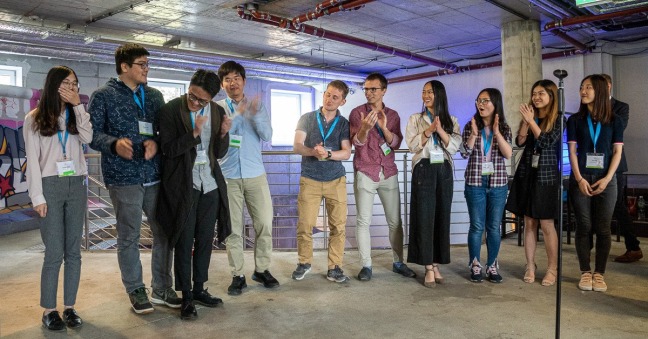Source: news.iastate.edu
AMES, Iowa — A team of Iowa State University graduate students beat nearly 150 teams from 114 universities in 28 countries, bringing home the top prize from the 20th annual Data Mining Cup. The winners were announced July 3 in Berlin.
Prudsys AG, a leading European data mining company, sponsors the intelligent-data analysis competition for universities. Data mining is essentially “finding and quantifying useful non-random patterns in large data sets,” said Stephen Vardeman, University Professor of statistics and industrial engineering.
Teams had six weeks to come up with a mathematical model to detect cases of fraud at self-checkout stations in grocery stores without putting innocent customers through unnecessary inspections.
“I was really confident in our model because it captured the relationship between input and outcome,” said Iowa State’s first place team leader and statistics Ph.D. candidate Qihao Zhang. “Sometimes people will try to use a complicated model, but the outcome may not be that stable. We developed a really simple model — which is not easy to find — to achieve our winning performance.”
In addition to Iowa State’s first place win, a second Iowa State team placed eighth in the competition.
This year’s achievement adds to an impressive history at the Data Mining Cup. In 2013, Iowa State entered the competition for the first time and placed fifth. In 2014, Iowa State was the first U.S. team to win the competition. Iowa State placed second and third in 2015, and second and fifth in 2016. This year, only 10 U.S. universities ranked in the competition, with George Washington University finishing third and the next closest to Iowa State’s eighth place finish landing in 45th place.
“Often, the top teams in these data mining prediction contests are within the margin of error from each other,” Vardeman said. “But Iowa State’s winners clearly blew the competition away this year.”
A jury scored all of the submitted solutions, and invited the top 10 teams to Berlin to present their solution methods at last week’s Prudsys retail intelligence summit, which examined how retailers can use artificial intelligence to be successful. Each team gave a 10-minute presentation.
The first place Iowa State team received a prize of 2,000 euros (about $2,244) and a plaque. Switzerland’s University of Geneva took second place, and Washington, D.C.’s George Washington University placed third.
Iowa State’s first place team members and their departments are Xingche Guo (statistics), Gang Han (statistics), Haoyan Hu (statistics), Qinglong Tian (statistics), Shaodong Wang (industrial and manufacturing systems engineering), Yueying Wang (statistics), Haihan Yu (statistics), Lijin Zhang (statistics), Qihao Zhang (statistics), Zerui Zhang (bioinformatics and computational biology), Wenting Zhao (statistics) and Yifan Zhu (statistics).
Iowa State’s eighth place team members and their departments are Oscar Aguilar (statistics), Reyhaneh Bijari (industrial and manufacturing systems engineering), Souradeep Chattopadhyay (statistics), Kanak Choudhury (statistics), Samira Karimzadeh (industrial and manufacturing systems engineering) and Hanisha Vemireddy (industrial and manufacturing systems engineering).
Guo, Tian, Zhu and Yueying Wang went to Berlin for the presentation and announcement.
“This is absolutely independent external validation of the strength of our students and our programs,” Vardeman said.
